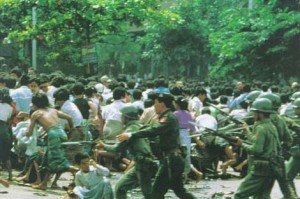About 8.8.88: Why is this Anniversary Important?
 One of Burma’s most important moments in history began at 8:08am on 8 August 1988 as peaceful demonstrations, escalating to a brutal massacre of protesters and civilians by the military regime.
One of Burma’s most important moments in history began at 8:08am on 8 August 1988 as peaceful demonstrations, escalating to a brutal massacre of protesters and civilians by the military regime.
Resentment towards Ne Win’s military regime for its human rights violations and catastrophic economic mismanagement simmered for decades, coming to a boil in 1988. During the summer of 1988, young student activists led numerous demonstrations. The regime’s responses to these demonstrations became increasingly violent, escalating from curfews and closing the universities, to opening-fire on protesters and rape.
By the end of the summer, the people of Burma had had enough. In an interview with the BBC, a student activist called for a nationwide protest on the auspicious date of 8 August 1988 (8.8.88), rallying the people from all parts of Burma to rise up against the oppressive regime.
At 8:08am, 8 August, thousands of people took to the streets in Rangoon. People from all walks of life, including monks, teachers, hospital workers, government workers, and many others all joined in the protests. As the day progressed, the protests grew in size and inspired citizens in other areas of Burma to join in demonstrations in their cities.
On the evening of 8 August, the military violently retaliated, opening fire with machine guns on the unarmed protesters. The shootings continued into the night and the following days.
The uprising of 8.8.88 continued for over a month following the initial protests, with hundreds of thousands of people across Burma demonstrating against the regime. Following a bloody crackdown on 18 September 1988, as many as 10, 000 student activists fled to the borders to continue their struggle for democracy and human rights. The military regained control of the population, but it is estimated that the regime killed as many as 10,000 unarmed protesters during the demonstrations.
About Injustice in Burma
Since 1988, the serious human rights violations and economic mismanagement that led to the national uprising have continued to worsen under the current regime.
Burma’s military regime tightly controls the country, systematically oppressing anyone opposing the regime and subjugating ethnic nationalities in the longest running civil war in the world. The regime rapes, kills, tortures, and arbitrarily arrests civilians, using them as human mine-sweepers and forced labourers. The United Nations Special Rapporteur on human rights in Burma, Tomás Ojea Quintana, has recommended that the UN consider establishing a commission of inquiry to investigate these serious international crimes. Read more about crimes against humanity in Burma.
The people of Burma have no legal recourse for the crimes committed by the military regime. The same officials that order the systematic attacks and abuses are in complete control of the justice system. The regime actively ensures that there is no judicial independence or impartiality in Burma’s legal systems; judges and lawyers remain pawns of the regime for fear of antagonizing authorities and being identified as opponents of the regime.
This year, Burma will hold its first elections in 20 years. The military regime seeks to show that it is moving the country towards a “disciplined democracy.” In reality, these elections will keep the military in power and perpetuate injustice. Read more about the elections in Burma.
The elections will bring into effect the fundamentally flawed 2008 Constitution that cements the military’s power and places them above the law. One section of the constitution states that members of the military regime cannot be held accountable for actions committed while carrying out their official duties. Once the elections are held and the 2008 Constitution takes effect, the current system of impunity will be entrenched, denying justice for the citizens of Burma, especially the victims of the regime’s human rights violations.
We are asking governments to not recognize the elections, unless the military regime releases all political prisoners, ends attacks against ethnic groups, and begins the process of national reconciliation by engaging in genuine dialogue with representatives of democratic groups and ethnic nationalities. We are also asking governments to support a commission of inquiry into the serious international crimes committed by the military regime, including crimes against humanity and war crimes.









 All posts
All posts